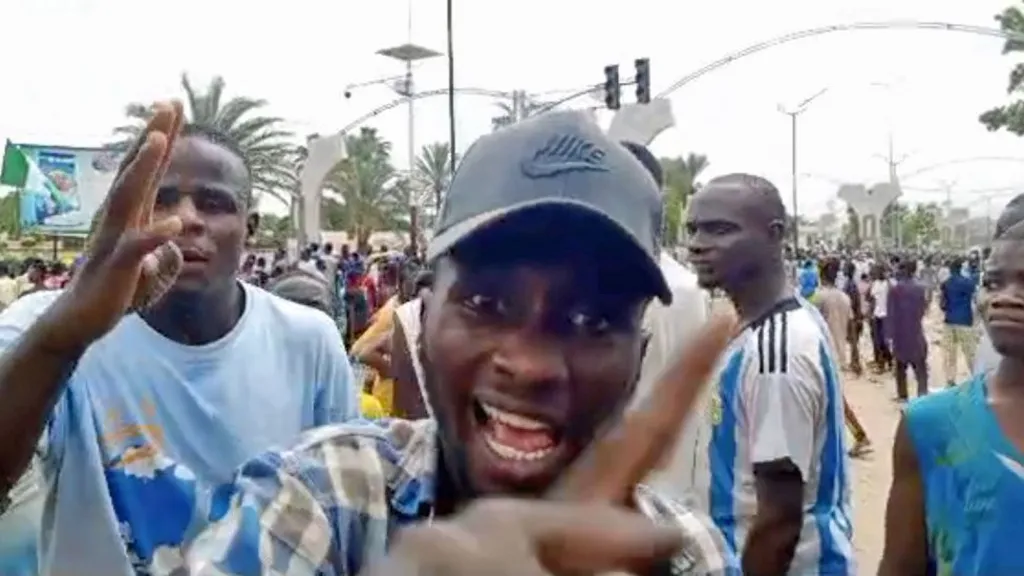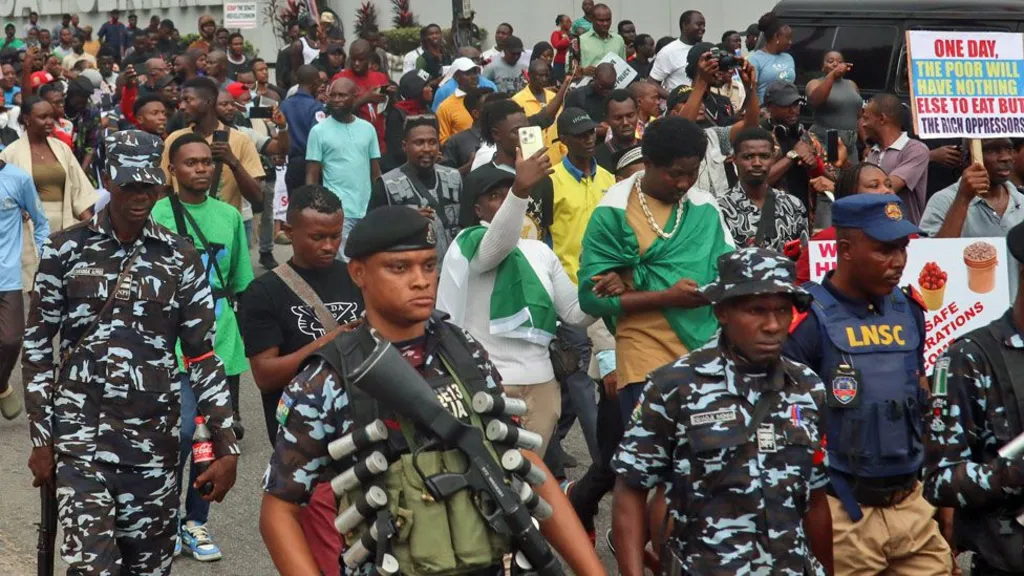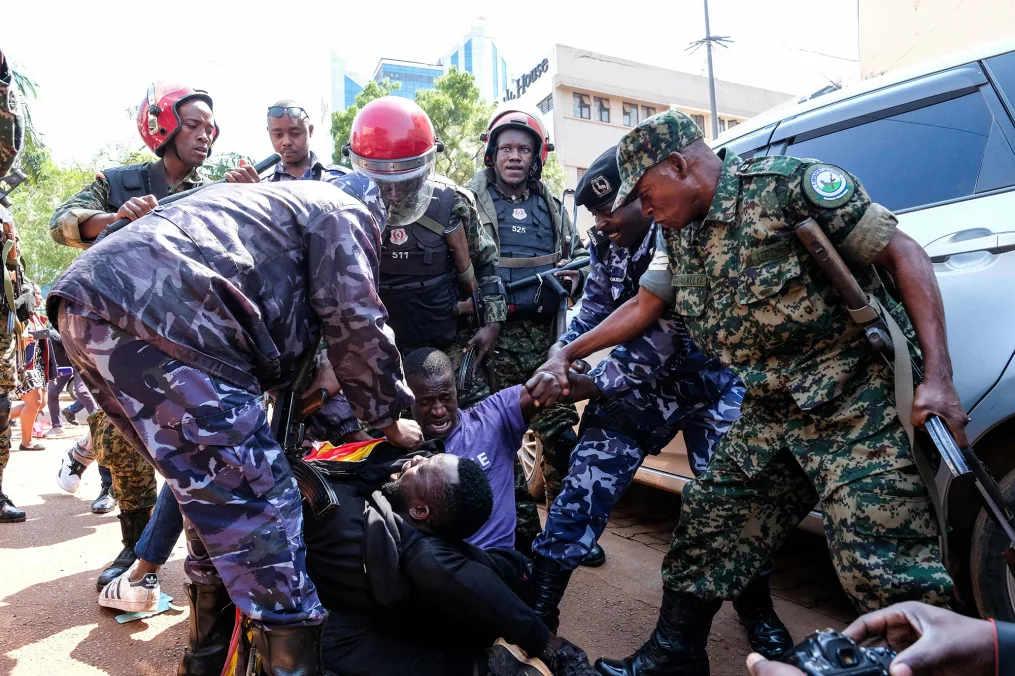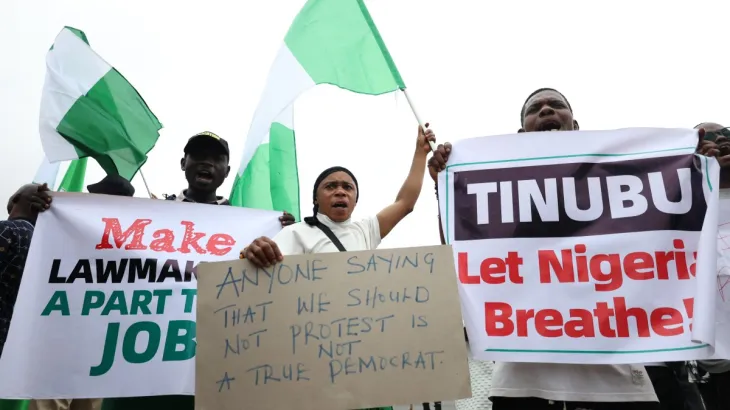Aug. 1—Nigerian police have fired live bullets and tear gas to try and disperse thousands of protesters in the northern city of Kano rallying against the rising cost of living.
Demonstrations are taking place in major cities across the country with some protesters chanting: “We are hungry.”
In Kano, which has seen the largest crowds so far, the gunshots were fired after protesters set alight tyres to make a bonfire in front of the state governor’s house. Four wounded people have been taken to hospital.

The protests have been organised via social media and inspired by the recent success protesters in Kenya who forced the government to scrap plans to increase taxes.
Officers have also sprayed hot water on the crowds in Kano, but they remain on the streets.
On Wednesday night, a court ordered that protesters in the capital, Abuja, to keep to the National stadium, which is located on the city’s outskirts.
But after gathering at the stadium’s gate on Thursday morning, the demonstrators – who have also been shouting the refrain “End bad governance” – began heading into the city centre.
This prompted police to fire tear-gas cannisters to try and stop the procession, which is affecting traffic.

Many of Abuja’s businesses, including banks, are closed.
The security forces are deployed at strategic locations within the capital and in surrounding towns.
Security forces blocked roads leading to Abuja’s Eagle Square – one of the planned demonstration sites – while in Lagos, police and soldiers were placed at strategic points, including at the Lekki toll gate, where protests in 2020 against police brutality ended in bloodshed.
“Duty is very clear: to ensure that the protest is peaceful, devoid of violence, devoid of the horrific things that happened during the rising in 2020,” Adegoke Fayoade, the state police commissioner in Lagos, told Journalists.
To ease the economic pain, the government on Wednesday announced some measures including delivering grain to states across the country and aid to the most needy.
But in markets across Nigeria, residents stocked up on food and essentials amid concerns over the likelihood of growing violence during the demonstrations.
“The police are brutalising the Nigerian people and people want that to stop,” activist Ismail Olushola Oladare, who participated in the 2020 protests, Journalists.
Protesters are making their way to the area of Ojota, where the government said the protesters could gather, and have been shouting “ole”, meaning “thief” in the Yoruba language – in reference to President Bola Tinubu and his government.
Many are angered by President Tinubu’s removal of a subsidy on fuel – announced with immediate effect during his inauguration speech in May 2023.
It was aimed at cutting government expenditure, but sent pump prices soaring with a ripple effect on other goods.
“Top on our demand is the subsidy removal. The government should reverse that decision,” Abuja protester Abiodun Sanusi told Journalists
They also want the government to carry out wide-ranging reforms to the country’s electoral system and the judiciary.
Dabiraoluwa Adeyinka, an activist who is protesting in Lagos, said the aim of the demonstration was to get the price hikes on essential commodities reversed.
Protest leaders, a loose coalition of civil society groups, promised to press on with rallies despite what they said were legal challenges trying to limit their rallies to public parks instead of marches.
Omolola Pedro, a protest organiser, said that the idea of the rallies was to let the government know that Nigerians have had enough of the government’s “abuse of human rights, unstable economic situation [resulting from] the policies that they have made”.
The organisers have presented a list of 19 demands. At the core of their grievances is the removal of a state subsidy on petroleum products, which they blame for the crisis.
The demonstrations come after weeks of unrest and antigovernment protests that turned violent in Kenya, where President William Ruto was forced to repeal planned tax hikes.
In Uganda, police detained dozens of people as they took part in banned anticorruption protests organised online by young activists inspired by Kenya’s rallies.

“Some groups of people, self-appointed crusaders and influencers, have been strategising and mobilising potential protesters to unleash terror in the land under the guise of replicating the recent Kenya protests,” said Kayode Egbetokun, Nigeria’s inspector general of police.
“We will, therefore, not sit back and fold our arms to watch violent activities unleash violence on our peaceful communities or destroy any of our national critical infrastructure and assets again,” Egbetokun said after meeting senior officers in Abuja.


